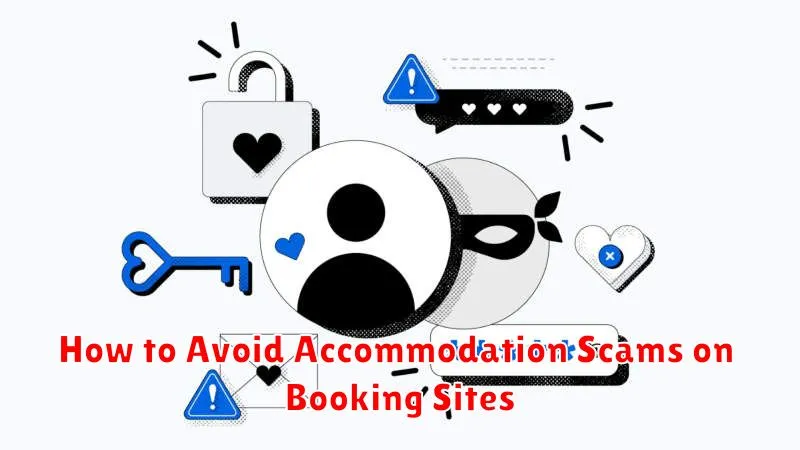Planning a trip can be exciting, but finding the perfect accommodation can quickly turn into a nightmare if you fall victim to a scam. Accommodation scams are unfortunately prevalent on booking sites, and it’s crucial to be aware of the risks. This article will provide you with essential tips and strategies on how to avoid accommodation scams and ensure a safe and enjoyable travel experience. Learn how to identify red flags, verify legitimate listings, and protect yourself from fraudulent activities when booking accommodations online. Understanding how these scams operate is the first step to safeguarding your money and your vacation.
Booking accommodations online offers convenience and a wide selection of choices, but it also exposes travelers to potential scams. From fake listings and phishing attempts to misleading photos and inflated prices, the risks are real. This guide will equip you with the knowledge and tools you need to avoid scams on booking sites. We will cover essential steps, such as verifying host information, scrutinizing reviews, understanding payment protocols, and recognizing the signs of a fraudulent listing. By following these guidelines, you can confidently book your accommodations and focus on enjoying your trip, worry-free.
Understanding Common Accommodation Scams
Phishing scams are a common tactic. Scammers create fake websites or send emails mimicking legitimate booking platforms. They aim to steal your personal information, including login credentials and credit card details. Always double-check the website URL and ensure it’s secure (https).
Bait-and-switch is another prevalent scam. You book a seemingly fantastic property at an attractive price, only to arrive and find it significantly different or unavailable. The scammer might then offer a less desirable alternative at a higher price. Carefully review property photos and verify details through multiple sources.
Payment request scams involve requests for payment outside the secure booking platform. Scammers might pressure you to pay via wire transfer or cryptocurrency. Always use the platform’s secure payment system to protect yourself.
Fake listings are entirely fabricated properties. These often boast incredibly low prices and enticing amenities to lure victims. Scrutinize listings for inconsistencies, unrealistic pricing, and lack of reviews.
Check for Verified Listings and Reviews
Before booking, verify the listing’s legitimacy. Look for indicators like verified badges or labels that the booking site uses to mark properties they have vetted. These badges often indicate that the platform has confirmed the property’s existence and ownership.
Reviews are crucial. Don’t just look at the overall rating; delve into the specifics. Read a range of reviews, both positive and negative, to get a balanced perspective. Look for recurring themes or concerns mentioned by multiple reviewers. Be wary of listings with overly generic or excessively positive reviews, as these can be fabricated.
Pay attention to the number of reviews. A higher number generally suggests a more established and reliable listing. Recent reviews are equally important, as they provide a more up-to-date picture of the property’s current condition and service. Consider if the reviews align with your expectations and priorities.
Avoid Paying via Direct Transfers

A major red flag for accommodation scams is a request for direct payment. Legitimate booking sites offer secure payment gateways, protecting both the traveler and the host. Never agree to wire money, use peer-to-peer payment apps, or send money directly to the host via bank transfer. These methods offer little to no recourse if something goes wrong.
Scammers often pressure potential victims by claiming they need the money urgently or offering significant discounts for direct payments. Be wary of these tactics. If a host insists on payment outside of the booking platform’s secure system, it’s highly likely a scam. Report such requests to the booking site immediately.
Sticking to the platform’s payment system ensures you have a documented transaction history and access to dispute resolution mechanisms if needed. This is crucial in protecting yourself against fraudulent listings and ensuring a safe booking experience.
Compare Images and Details Across Platforms
A crucial step in verifying a listing’s legitimacy involves cross-referencing information. Compare the images and property details on the booking site with other platforms. Look for inconsistencies in photos, descriptions, amenities, or addresses. If the property is listed on multiple platforms, ensure the details are consistent across all of them.
Significant discrepancies between platforms could indicate a potential scam. For example, if the photos look drastically different, the description varies greatly, or the address doesn’t match, proceed with extreme caution. A legitimate property should have a consistent online presence.
Utilize search engines to verify the property’s existence independently. Search for the property name, address, or even the images using reverse image search tools. This can help uncover whether the images are being used without authorization or if the property is genuinely associated with the listed address.
Confirm Booking Directly with Property
After finding a promising listing on a booking platform, take the extra step of confirming the reservation directly with the property. This helps verify the listing’s legitimacy and allows you to double-check details like pricing, amenities, and cancellation policies.
Look for the property’s official website or contact information (phone number or email address). Communicate directly with the accommodation provider to confirm your booking details. This direct interaction can also provide a chance to ask any specific questions you might have.
Be wary if the host or property insists solely on communication through the booking platform or requests payment through unconventional methods. Legitimate businesses are usually transparent and willing to engage through multiple channels.
Report Suspicious Listings Immediately
If you encounter a listing that appears suspicious, report it to the booking site immediately. This helps protect other travelers from potentially falling victim to a scam. Indicators of a suspicious listing might include dramatically low prices, poor quality photos, inconsistent or vague descriptions, or a lack of reviews.
Booking sites typically have a reporting mechanism readily accessible on each listing page. Look for options like “Report this listing,” “Flag as inappropriate,” or “Contact customer support.” Provide as much detail as possible when reporting the listing, including specific reasons for your suspicion. Screenshots of the listing can also be valuable evidence.
By promptly reporting suspicious activity, you contribute to a safer online booking environment for everyone. Your vigilance can help booking sites identify and remove fraudulent listings quickly.
Use Credit Cards for Safer Transactions
Using a credit card offers an additional layer of protection against fraudulent activities when booking accommodations. Credit cards typically have robust fraud protection policies that can help you recoup your losses if you encounter a scam.
Unlike debit cards which directly deduct funds from your bank account, credit cards provide a buffer. If a fraudulent charge appears, you can dispute it with your credit card company and withhold payment while the investigation takes place. This limits your financial liability.
Many credit card companies offer purchase protection benefits as well. These benefits may cover you if the accommodation you booked is not as advertised or if the provider fails to deliver the promised services. Check with your credit card company to understand the specific protections offered.

